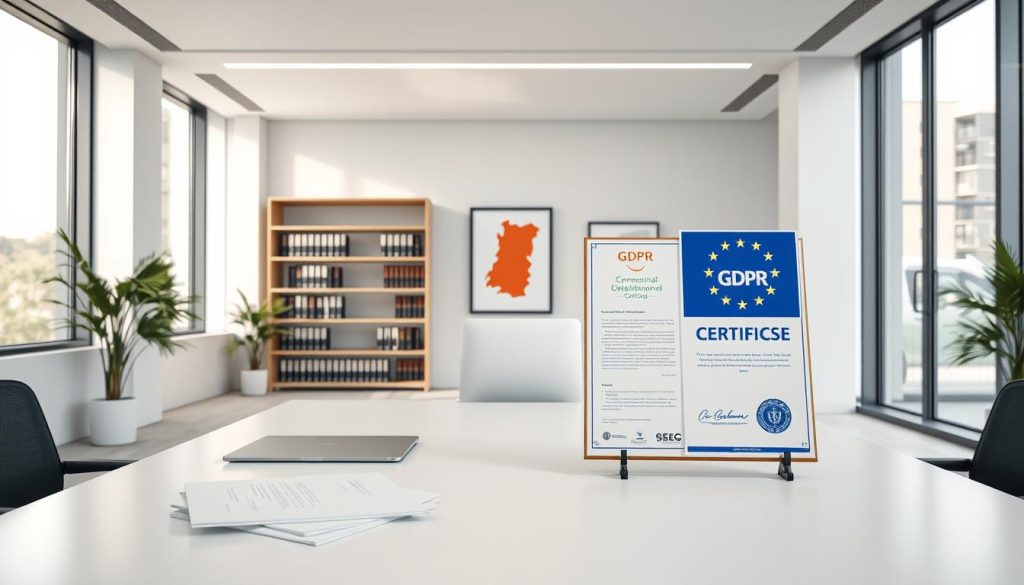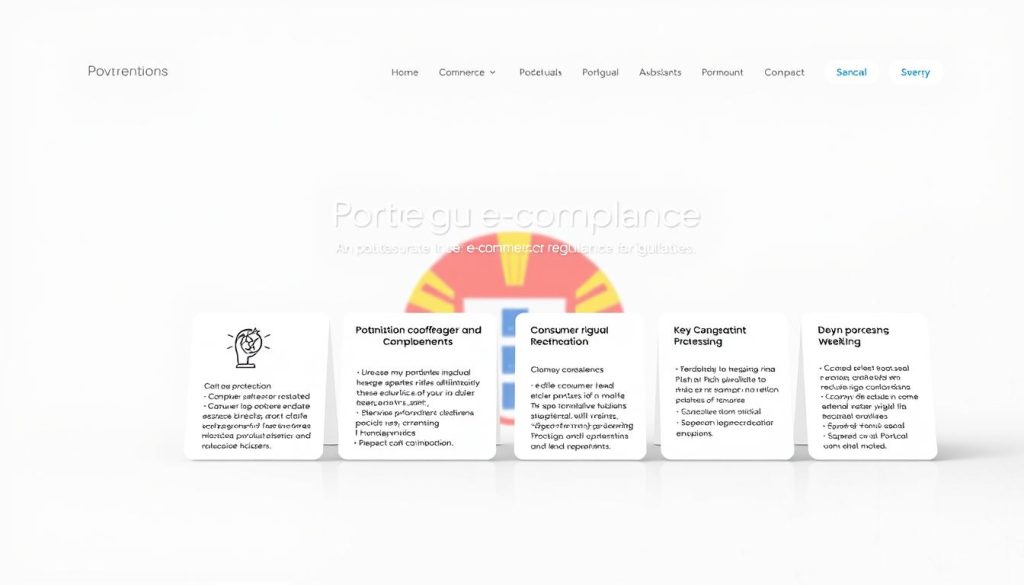In Portugal, the e-commerce world is growing fast. Businesses need to know the legal rules for selling online. The B2C eCommerce market hit USD 3.740 billion in 2020. It’s vital to understand Portugal’s e-commerce laws.
We’ll look at important parts of online business rules. This includes protecting consumers, keeping data private, and following market competition rules.
Many companies are moving online, more so during the pandemic. We’ll explain the key laws for e-commerce in Portugal. We’ll also show how services like LerriHost can help businesses follow these rules.
Understanding E-commerce Legislation in Portugal
When we explore e-commerce in Portugal, knowing the laws is key. These laws cover online sales, consumer rights, and data protection. Decree-Law 7/2004 and Law 46/2012 are vital. They set out what businesses must do to follow the law and keep the digital world safe.
Overview of E-commerce Laws
The laws in Portugal protect both shoppers and sellers. Decree-Law 7/2004 makes sure online deals are clear and fair. Law 46/2012 focuses on keeping personal data safe. Knowing these laws is vital for any business wanting to be trusted online.
Importance of Compliance
Following e-commerce laws is more than just following rules. It builds trust with customers and avoids big fines. Companies that follow the law are reliable and trustworthy. This helps them stand out in the online world.
Key Regulatory Bodies
In Portugal, several bodies watch over e-commerce. The National Communications Authority (ANACOM) looks after digital communications. The Competition Authority (AC) makes sure the market is fair. The General Directorate of Consumers (DGC) helps protect shoppers. Knowing what these bodies do helps e-commerce thrive.
Company Formation Requirements
Starting an e-commerce company in Portugal needs a clear plan. We must know the steps to register and the legal rules. We will look at the legal options and what documents are needed to register an e-commerce company.
Steps to Register an E-commerce Company
To register an e-commerce company in Portugal, follow these steps:
- Choose a legal structure that fits our business goals.
- Get the needed documents for a smooth registration.
- Apply to the Portuguese authorities with accurate details.
- Get a tax identification number from the tax office.
- Finish the registration and get our company number.
Legal Structure Options
When forming a company in Portugal, we have several options. These include:
- Sole Proprietorship: Simple for solo entrepreneurs.
- Limited Liability Company (LDA): Good for small to medium businesses.
- Public Limited Company (SA): Best for big businesses wanting to raise capital.
Required Documentation
To register our e-commerce company, we need certain documents:
- Proof of identity for all owners and directors.
- Tax identification numbers for everyone involved.
- Certificates of incorporation, if needed.
- A business plan with our e-commerce goals and strategies.
- Proof of a business address in Portugal.
Nominee Services for E-commerce Businesses
For e-commerce businesses in Portugal, nominee services are key. They protect ownership and meet local laws. This keeps businesses private while they follow the rules.
Importance of Nominee Services
Nominee services hide the true owners of a business. They offer a local face for dealing with government bodies. This helps keep business safe and makes legal tasks easier.
How LerriHost Can Assist
LerriHost helps e-commerce businesses in Portugal a lot. They act as a local nominee, keeping ownership secret. This lets businesses grow without worrying about legal stuff.
Compliance and Privacy Considerations
Keeping to the law and privacy is vital for e-commerce. Nominee services help with this in Portugal. LerriHost makes sure everything is legal, so businesses can focus on growing.
Banking and Payment Processing Solutions
For e-commerce businesses in Portugal, having good banking solutions is key. The first step is to open a business bank account. This helps us manage our money well. When choosing a bank, we should look at their services, fees, and how they handle international money transfers.
Opening a Business Bank Account
We must pick a bank that fits our business needs. Important things to think about include:
- Account fees and charges
- Online banking ease
- Support for different currencies
- How good their customer service is
Choosing the right bank helps us manage our e-commerce banking better. This makes sure our transactions go smoothly for our customers.
Payment Processing Requirements
In Portugal, payment processing must follow strict rules for safe transactions. We need to follow local laws on:
- Data protection and consumer rights
- Anti-money laundering rules
- Keeping transactions safe
Following these rules protects our business and builds trust with our customers.
Supported Payment Methods
Offering many payment options makes shopping better for customers. In our e-commerce, we should have:
- Credit and debit cards
- PayPal
- Local payment gateways
By adding these to our payment system, we meet more customer needs. This boosts sales and makes customers happy.

Taxation and E-commerce
In the world of e-commerce in Portugal, businesses face many tax rules. They must deal with corporate tax and VAT registration. For online sellers, knowing these rules is key to staying legal.
Overview of Tax Obligations
E-commerce firms have to follow tax rules, which change based on their sales and where they sell. They must think about corporate tax and VAT, mainly when selling to EU customers.
VAT Registration
Getting a VAT number is essential for EU sales. It lets businesses collect and send taxes based on where the customer is. This affects prices and keeps them in line with local tax laws.
Tax Compliance for Online Sales
Keeping up with online sales tax rules is ongoing. It means staying updated on Portugal’s tax laws and being ready for audits. Ignoring these rules can cause big problems for your business.
| Tax Type | Description | Registration Requirement |
|---|---|---|
| Corporate Tax | Tax on profits from business activities. | Mandatory for all businesses. |
| VAT | Tax on goods and services sold. | Required if sales exceed the threshold. |
Data Protection and GDPR Compliance
The General Data Protection Regulation (GDPR) is key in e-commerce in Portugal. It has rules to protect personal data and make sure businesses are clear about how they use it. Companies must follow strict rules to respect customer data rights and meet data protection Portugal standards.
Understanding the GDPR
GDPR creates a system for handling personal info. It covers all businesses dealing with EU citizens’ data. It’s important for companies to clearly tell customers how they use their data. They must get clear consent before collecting any information.
Data Handling Best Practices
To follow GDPR compliance, we need to do a few things:
- Use data encryption to keep sensitive info safe.
- Do regular data protection impact assessments.
- Only collect data that we really need.
- Have plans for handling data access and erasure requests.
Customer Rights Under GDPR
GDPR gives customers many rights over their personal data. These include:
- The right to see their data we hold.
- The right to correct any wrong info.
- The right to have their data erased.
- The right to move their data to another service.

Consumer Rights in E-commerce
In Portugal, consumer rights are well-protected by strong laws. These laws help buyers in the e-commerce world. It’s key for both shoppers and online stores to know these rules.
Following these laws builds trust and ensures everyone is happy.
Overview of Consumer Protection Laws
Consumer rights in Portugal cover many online laws. These laws say sellers must be clear about what they sell. This means giving out all the facts before you buy.
Things like prices, what the product is, and any extra costs are covered. Online stores must tell customers these things to avoid problems.
Information Requirements for Consumers
Consumer law says we must give clear info before you buy. This includes:
- Detailed product descriptions.
- Clear terms of sale.
- Details on shipping costs and times.
- How to get in touch with customer support.
It’s not just the law. Giving out the right info makes shopping better and helps stores keep customers happy.
Returns and Refund Policies
Return and refund policies are key in e-commerce. In Portugal, you can return a purchase within 14 days. This shows how important it is to have a clear return policy.
Online stores should explain how to return items and when you’ll get your money back. They should also say when you can return something and under what conditions.
Being clear about this makes customers trust you more and follows the law.
Advertising Regulations for E-commerce
It’s vital for e-commerce businesses in Portugal to know about advertising rules. These rules help keep marketing fair and honest. Following these laws is key for ethical and successful online marketing.
They guide how we share information with customers. This is important for our marketing strategies. It ensures our messages are clear and true.
Compliance with Marketing Laws
Online marketing laws in Portugal say ads must be honest. False ads can harm a business’s reputation and income. So, we must make sure our marketing is accurate.
Guidelines on Online Advertising
There are rules for online ads too. E-commerce sites must clearly state important information. This helps customers make good choices.
Following these rules builds trust and openness in our ads. This can really help with customer interest.
Disclaimers and Transparency
Being open in our ads is essential. We must clearly show any important details. This is good for our reputation and builds trust with customers.
Customers value honesty. This can lead to more sales and loyal customers.

Intellectual Property Considerations
Keeping our brand safe online is key for e-commerce success. Intellectual property protection is vital for staying unique and safe. In Portugal, following copyright laws and trademark registration is essential for our brand’s identity.
Protecting Your Brand Online
To protect our brand, we need a few strategies. Getting our trademarks registered is a must, as it gives us exclusive rights. Also, watching our brand online helps us spot any misuse early.
Copyright and Trademark Laws
Knowing copyright laws in Portugal is critical for creative works like text, images, and designs. Trademark laws protect our logos and brand names. Following these laws helps us build a strong defense for our intellectual property.
Handling Infringement Issues
Quick action on infringement issues is important for our reputation and finances. We should have a clear plan for dealing with violations. Sites like Amazon and eBay have tools to help us fight infringement.
Staying updated and using resources like this guide helps us face infringement head-on.
Building Your E-commerce Website
Creating an e-commerce website needs careful thought about legal rules in Portugal. We must make sure our site looks good and works well. It also has to follow the law, including making clear terms and a strong privacy policy.
Legal Aspects of Web Design
When we build our e-commerce site, we must follow Portugal’s website rules. We need to show our products and services correctly and protect our customers. A clear design that shows customer rights helps build trust and reduces legal problems.
Importance of Terms and Conditions
Website terms and conditions are key in setting out our relationship with customers. They explain what each side is responsible for. Good terms help us by setting rules for selling products and services. They also tell users what to expect when using our site.
Privacy Policy Essentials
A good privacy policy is essential for following data protection laws and gaining customer trust. It should explain how we handle customer data. It must cover data access, correction, and deletion rights, following GDPR and other laws. Being open about personal data helps us stand out in the e-commerce world.

Maintaining E-commerce Compliance
In the fast-changing world of e-commerce, keeping up with legal standards is key. Regular legal checks are not just a formality. They are vital for making sure we follow the law. By having strong legal review plans, we can spot and fix any compliance issues early on.
Regular Legal Review Strategies
To keep up with e-commerce laws, we must watch regulatory updates in Portugal closely. We need to know about changes to laws like GDPR and PCI DSS. These changes can greatly affect how we run our business.
Regular checks on our compliance help us understand the legal world better. They also help us improve how we protect data. Being proactive helps create a culture of following the rules in our company.
Keeping Updated with Regulatory Changes
Keeping up with new rules is a team effort. We all need to be committed to it. Using reliable sources like compliance resources is very helpful. It helps us make sure our plans match the legal standards in Portugal.
By doing this, we can feel more confident and strong in the competitive e-commerce world.







